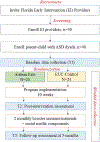A nutrition education intervention to improve eating behaviors of children with autism spectrum disorder: Study protocol for a pilot randomized controlled trial
- PMID: 35671902
- PMCID: PMC10822341
- DOI: 10.1016/j.cct.2022.106814
A nutrition education intervention to improve eating behaviors of children with autism spectrum disorder: Study protocol for a pilot randomized controlled trial
Abstract
Autism spectrum disorder (ASD) is a developmental disorder that affects communication and social behaviors. Children with ASD often experience mealtime behavior challenges and selective eating behaviors. They also tend to consume fewer fruits and vegetables and more high-energy dense foods, compared to neurotypical peers. A nutrition intervention was designed to prevent the development of feeding disorders and the long-term negative health impacts associated with poor dietary intake. This randomized controlled trial will evaluate the feasibility and preliminary efficacy of the nutrition education intervention for children with ASD and their parents through the Early Intervention (EI) services. We will recruit EI providers and parent-child dyads (n = 48) from EI programs, and randomly assign them into Autism Eats intervention (n = 24) or enhance usual care (EUC) comparison group (n = 24). The Autism Eats is 10 weekly sessions delivered individually as part of EI, while the EUC group will receive only 1 nutrition education session and then weekly parent handouts. The Autism Eats integrates ASD-specific feeding strategies and behaviorally-focused intervention strategies such as goal setting. Feasibility indicators include reach/participation, attrition, completion, fidelity, compatibility, and qualitative participant feedback. Outcome measures include dietary intakes and mealtime behaviors of children with ASD using 3-day food records and a validated questionnaire, the Brief Autism Mealtime Behavior Inventory (BAMBI). We will examine whether there are differences in children's food intakes, variety, diet quality, and mealtime behaviors between Autism Eats and EUC groups at post-intervention and 5-month follow-up assessment. This study will provide critical data to inform a full-scale randomized controlled trial.
Trial registration: ClinicalTrials.gov NCT05194345.
Keywords: Autism spectrum disorder; Children; Eating behaviors; Nutrition intervention; Randomized controlled trial.
Copyright © 2022 Elsevier Inc. All rights reserved.
Conflict of interest statement
Declaration of Competing Interest
The authors declare that they have no known competing financial interests or personal relationships that could have appeared to influence the work reported in this paper.
References
-
- Provost B, et al. , Mealtime behaviors of preschool children: comparison of children with autism spectrum disorder and children with typical development, Phys. Occup. Ther. Pediatr. 30 (3) (2010) 220–233. - PubMed
-
- Mari-Bauset S, et al. , Food selectivity in autism spectrum disorders: a systematic review, J. Child Neurol. 29 (11) (2014) 1554–1561. - PubMed


